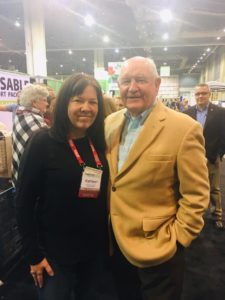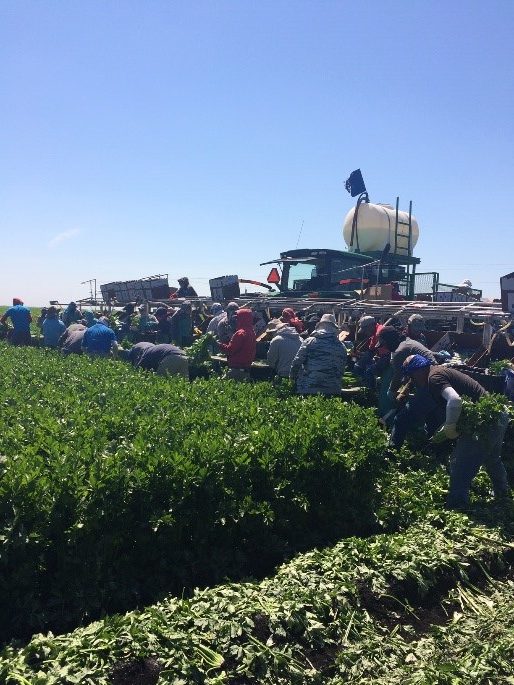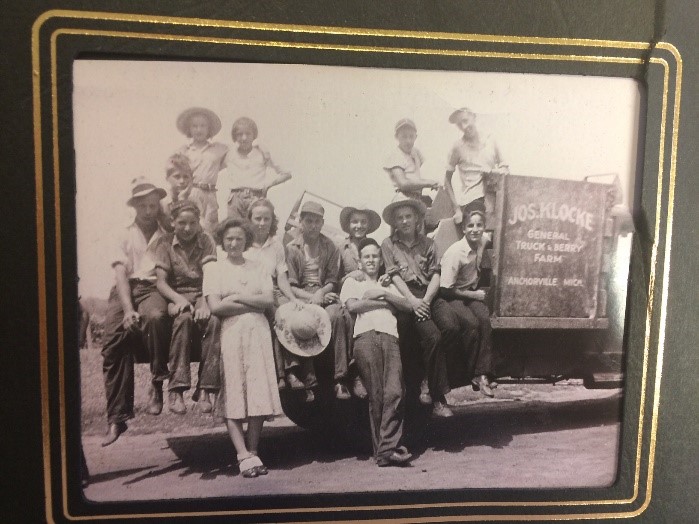Kathy Brown: Helping to Keep Food Production Safe and Legal
By Joan Doggrell

Kathy met our former governor, Sonny Perdue, at an expo in Savannah
Have you ever wondered how those beautiful fresh vegetables and fruits get from the farms to your grocery store? Well, it’s a multi-stage journey. St. Paul’s Kathy Brown is familiar with the early stages of that journey. She plays a role in bringing documented workers into the United States to harvest crops. She is an H2A consultant who works for farm labor contractors and farmers throughout the United States. An H2A visa allows a farmer or a farm labor contractor (FLC) to bring workers into the US legally for a limited period ranging from two months to a maximum of 10 months.
Her focus is vegetable and fruit farms. She is quick to state that she does not work with livestock farmers. Her job takes her as far north as Michigan, as far west as Texas, and south into Florida.
Kathy helps farmers and farm labor contractors ensure that they are in compliance with the US Department of Labor and Occupational Safety and Health Administration (OSHA) standards. She also assists them with Workers Compensation, general liability, insurance, and housing. In addition, her job includes follow-up visits to the farms to make sure the workers are being treated with compassion and that the workers themselves are meeting their obligations to the farmer.
“It’s a two-way street,” said Kathy. “I make sure the workers are doing what they promised to do and that the farmer or the farm labor contractor (FLC) is fulfilling his promise to the worker.”
“I’m there when they get off the bus,” she adds. “Somebody has to sign the paperwork that makes them employees of the farmer.”

Celery farm workers in southwest Florida
The H2A program
The US government started the H2A program during World War II when a lot of the men who worked on the farms or owned the farms signed up for the war. There was a shortage of pickers to harvest the fruit and vegetables, so the government started bringing foreign workers into the US to help with the harvest. This was called the bracero program. That’s where migration began generations ago. Then after the war, the government started the H2A-B visa program for migrant workers. H2A visas are agricultural, H2Bs are non-agricultural, and then there are student visas. All carry different conditions for the employer.

“My maternal grandmother’s family owned a blueberry farm in Michigan. This was her with the fruit harvesters.” Kathy
A contract is signed between the worker and whoever is offering the job, the farmer or the FLC. The contract specifies what is going to be harvested and how much the worker is going to be paid. Every state has a different hourly rate. Florida’s is $11.24 an hour. North Carolina’s is $12.25 an hour. Workers must supply the government with the address of every farm where they are going to pick, what type of produce, and what they are willing to minimal pay the worker, sometimes it is a piece rate that makes it more profitable for the farmer and the worker. They will have to be paid the minimal H2A hourly rate, which changes from state to state.
“I would estimate that around 15% of the agriculture workers are here with H2A visas,” said Kathy. “The rest of the workers are undocumented or unemployable in other business sectors. However, the H2A program is growing, especially in Georgia right now, which is the top state for H2A applications. Ten years ago, the program brought in over 95,000. I think last year it brought in more than 170,000 people.”
Many of these people have been college educated in Mexico and are paying off student loans. Most are young, usually under 25. They are here to work.
To bring somebody here legally in the H2A program costs $1500.00, which is paid by either the contractor or the farmer. “A lot of the contractors don’t like bringing the same persons after three or four years,” said Kathy. “They get so Americanized that their productivity does not keep up. They don’t make money either if the men or the women don’t pick enough. Everyone has to work together.”
Farmers’ obligations to workers
The workers’ housing is regularly inspected by the Federal Housing Authority. Farmers who don’t own homes for the workers rent hotels. The rules are very nitty-gritty. Trash cans must have lids, there must be sufficient rolls of toilet paper for every worker, etc. Farmers are fined if any of these areas is deficient.
Furthermore, the Department of Labor (DOL) can show up at any time of the day for an inspection. So if a worker didn’t put the lid on a trash can, that means a fine for the farmer of $250.00.
“The workers come from a third world country,” said Kathy. “Many of them don’t like certain living conditions such as the screens on the windows. They will take them off. So when the DOL comes in and inspects the housing, the farmer gets in trouble”
“But I like the program,” Kathy added. “I think it benefits everybody, although It’s very expensive. The farmer has to have a serious labor shortage to want to do this.”
How Kathy became an independent contractor
Kathy first got into the migrant worker business when she lived in central Florida, the citrus capital of the world. She started out working for a company that verified paperwork for domestic workers. As the company grew, she added more skills, including unemployment processing, accounts payable, and finally Workers Compensation.
“My dad had a Workers Comp claim when I was growing up, so I felt I was doing something good this time. I understood what a family should receive,” said Kathy.
Kathy worked with Workers Compensation for fourteen years.
“During that time, I learned about compliance, risk management, and OSHA,” said Kathy.
Then 9/11 hit, and everything changed.
“Before 9/11, my boss worked with H2B workers. He had maids in hotels and people in manufacturing. In the wake of 9/II he had to send all these people home. Several apartments for them were rented in his name, and he couldn’t break the leases. He had to keep paying. It was bad, but we struggled on.”
Then in 2004, four hurricanes went through central Florida. The crop was almost wiped out.
“We struggled. We all cut back on our hours. But the company never recovered. My boss lasted another eight years,” said Kathy. “But In 2012 he closed up shop. I really thought I was done with agriculture; maybe it was my time to do something different.”
But within three or four months, she had clients coming to her asking for help.
That was when Kathy first became an independent consultant. Within six months, she had fifteen clients. But then Harbor America offered her a job doing what she loved: Workers Compensation. That job lasted until disaster struck again; the company was bought by venture capitalists. They structured things differently in the company, and the clients missed the service that they had come accustomed to. So Kathy decided it was her time to move on.
“I had run the agricultural segment of the business for five years,” said Kathy. “I’d doubled it. Our Workers Compensation claims, which were at a 130% loss ratio, went down to 30%. But after the venture capitalists took over, I’d be on the phone from Thursday night until Sunday trying to correct mistakes they had made. The workers live check to check. If they earn $500, $400 goes home to their families. That money has to be there. Also, part of the DOL regulations state that workers are always paid on the same day of the week. If they don’t get paid on time, the farmer is not in compliance, and I have just cost him a fine.”
“I no longer loved my job. So I told my boss I quit.”
But she wasn’t idle for long. She soon had clients again, calling her and requesting her services. There was plenty to do.
“The hardest thing for the FLCs and the farmers to obtain is Workers Compensation,” said Kathy. “Nobody wants to insure these workers because every day they’re in a school bus with forty-five people or a van carrying fifteen, and that’s a huge liability.”
When they harvest, they get up at 6:00 am. They can be driven up to fifty miles a day without being paid an hourly rate for their travel time.
“When we bring a group of workers onto the program, we inspect the buses, making sure the tires are good. They don’t have to have seatbelts because school buses don’t have them. But the tires are a big thing. A lot of times, the buses are driven so much that their tires will be showing metal. And they’re transporting lives every day. So we’ll go in and make sure the school buses are up to standard. The good thing with the H2A program is that before the FLCs bring people over, they have to get their vehicles inspected. That’s what I like about the program. There are so many safety standards that the farmer and the FLC have to meet.”
But undocumented workers are not so fortunate.
“There’s a whole other side to the business which we try to avoid,” said Kathy. “Sometimes people actually pay to get these jobs. They will go borrow money from family – they have this idea of the American Dream, and they want to come here. It’s illegal, and a horrible scam where these people are taken advantage of, but the practice goes on all the time.”
“On a farm in South Georgia that was next to one of the farms I was working with, they had fifty women working out in the heat and living in a two-bedroom trailer. These women were sleeping on the floor. That was in 2018. It still goes on.”
She also sees the consequences of illegal transportation practices.
“You don’t see it so much where we live because there’s no farming here – we’re in a metropolitan area. But in Florida there are orange trees everywhere. In South Georgia you see the school buses where they are harvesting watermelons. They overload the buses because if they can put four or five extra workers in the bus, they don’t have to pay for another driver or fuel.”
“In the mid-2000s, a fifteen-passenger van with twenty-three illegal domestic people flipped on a major interstate. All of them either died or became wheelchair-bound.”
Kathy is in a position to observe first-hand what the rest of us only hear about through the news media.
“We’re going on a third generation of Hispanic people born in the United States,” she said. “They are not picking anymore. They are doing landscaping or construction, where they can make more money and work in a safer environment. A lot of the women are employed in the fast food industry. Although these jobs usually pay only minimum wages, the workers are not out in the heat, and they have benefits such as health insurance.”
“False documentation is easy for undocumented workers to come by. They will get a fake Social Security card and a driver’s license. The scary thing is, you can go into these mom and pop gas stations in rural areas and buy IDs for ten dollars. They’ll get their ID and take a job just harvesting. When they fill out their W2 and W4, they will put in ‘married, 8 children’ to minimize the amount held back by the employer. But they are still taxed for Social Security, and they don’t get to claim it. They never get their contribution back. It’s a side of the taxes most people do not talk about.”
Do migrant workers take jobs away from Americans?
This is Kathy’s answer to that question.
“People ask, why do we bring these people here to work when Americans need jobs? It’s not true that they’re taking Americans’ jobs. These are hard-working people who do jobs that Americans won’t take, such as butchering animals. That is an emotionally draining thing to do. The H2A workers are no different from you and me. But they take these jobs because they need to earn money for their families back home.”
“Oranges are picked in huge sacks. Full, they can weigh up to 90 pounds. Carrying a 90-pound sack around your neck and up a 20-foot ladder is hard labor. I don’t know anyone that wants to do that or to sit in the sun and pick fruit or vegetables.
“Alabama passed a law about ten years ago that enforced the use of E-Verify. Crops were left out in the field. Of course, it was illegals that were picking the product. Because the state made the farmers use E-Verify, I don’t know how many hundreds of acres of crops were lost.
“If you had American workers picking fruit, there would be Workers Compensation claims, unemployment claims. And you’d probably be paying eight dollars for those two tomatoes you paid three dollars for.”
Those Pesky Food Safety Regulations
We hear a lot of complaints about regulations that hamper business. Kathy has first-hand experience to share on that subject as well.
“The food standards of safety in the US are ten times better than those of any other country. I’ve never been to the farms of Mexico and South America, but I’ve seen pictures. Believe me, you don’t want to think about that stuff.
“Through my position on the agricultural side, I got invited to one of Publix’s food safety class. Publix periodically goes into farms in the US, and they swab everything. They look for listeria, e-coli, just as an extra safety concern. That is why the shelf life for their products isn’t as long because they take that extra step. We should be grateful for the US food safety standards, because for the amount of food that is picked and harvested here in the States, there should be a lot more illness. But our government has almost perfected keeping us safe”
So the next time you buy fresh produce, remember Kathy. She works in an imperfect system, but she does her best to protect the people who harvest our food – and indirectly, she is protecting you.

